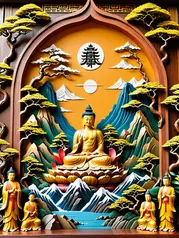According to the current understanding, I was born in 1991, which makes me part of the post-90s generation.
Because I was quite slow-witted, my father didn’t send me to school and kept me locked up at home all day to do chores. However, my childhood was quite happy because my mother loved me dearly; after all, I was her own flesh and blood.
But everything changed on my 13th birthday.
That day, there was a sense of unease in the house as someone called “Imperial Army” was said to be coming.
He must have been an important person because I was locked away in a small dark room and not allowed to come out.
The small dark room was shabby, with holes all over the walls.
I leaned against the wall and could just see the front door of the house.
I could hear the loud noise outside as firecrackers went off, and then the front door was pushed open.
My memory stops there; everything that happened next is a blur, like waking up in the morning trying to recall a dream. I had just experienced a life-and-death separation, yet when I reached out, I grasped nothing.
The next thing I remember is finding myself in this strange hospital.
This hospital is called “Dahongyuan Hospital.” It is a Western-style hospital but also serves as a temple.
It is said that the Abbot is a Western-trained doctor who returned from studying abroad. Following the Buddhist principle that “saving a life is better than building a seven-story pagoda,” he transformed the temple into a hospital to treat and save people.
But strangely, although I am here, I am neither a doctor, a nurse, nor a patient; I am just a girl.
I wander around like a Wandering Soul.
No one pays attention to me, and hardly anyone speaks to me, yet there is always a seat for me in the cafeteria and an empty bed for me in the ward.
When I feel bored, I sit in front of various Buddha statues; when I have free time, I help the nurses tidy up the sheets.
I am quite content with my current life; I feel happy. Even if I were to spend my entire life in this hospital, I would still find joy in it.
That said, even if I wanted to leave, there would be no way to do so.
The hospital's main entrance is always locked tight, and I have no idea how the staff come and go. Yet this hospital seems to be thriving; every day several critically ill patients are brought in, and some are discharged after recovery, while only a small number are covered with a White Sheet.
Being covered with a White Sheet means one has died.
Death means going to another world, as the Abbot and Chief Surgeon told me.
He is one of the few people who speaks to me.
When a patient dies, the Abbot places a burner of incense at the head of the deceased's bed and then joins his hands together, silently reciting a passage from scripture.
I am quite familiar with this scripture because I have memorized it; it is from the Ksitigarbha Bodhisattva Sutra, which tells the story of a Bodhisattva named Ksitigarbha who refuses to attain Buddhahood and instead spends his days in hell helping sentient beings.
The scripture states that Ksitigarbha Bodhisattva was once an ordinary woman whose mother, due to her disbelief in the Three Treasures, suffered in Avici Hell after death.
In her desperation, she sold her possessions to support the deities and Buddhas, ultimately securing her mother's liberation and passage to the Western Paradise.
Thus, Ksitigarbha Bodhisattva embodies filial piety.
Every time I hear this passage, I can't help but wonder: Where has my mother gone? Is she also suffering in hell? What truly happened on the day I lost my memory, and how did I end up in this temple?
Yet, I can never seem to recall.
If only I could meet that person known as the Imperial Army once more.
"Meeting by chance is better than a planned encounter," as it speaks of everything being left to fate.





![]() 30
30
![]() 50
50
![]() 100
100
![]() 200
200
![]() 1000
1000
![]()
![]()
Comment 0 Comment Count